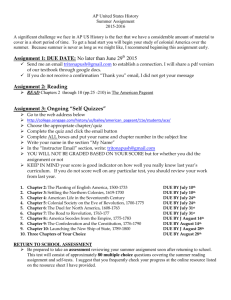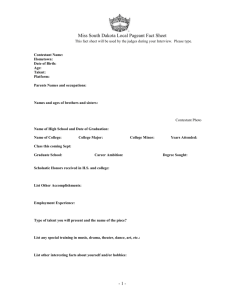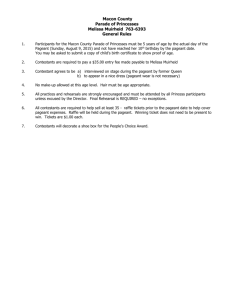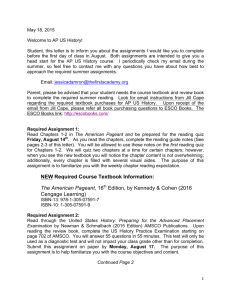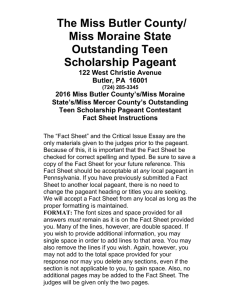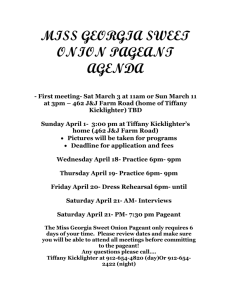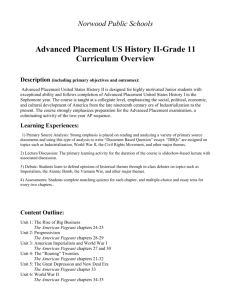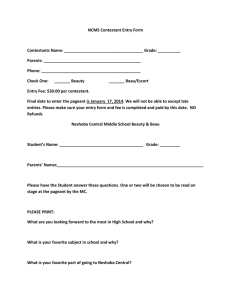File
advertisement
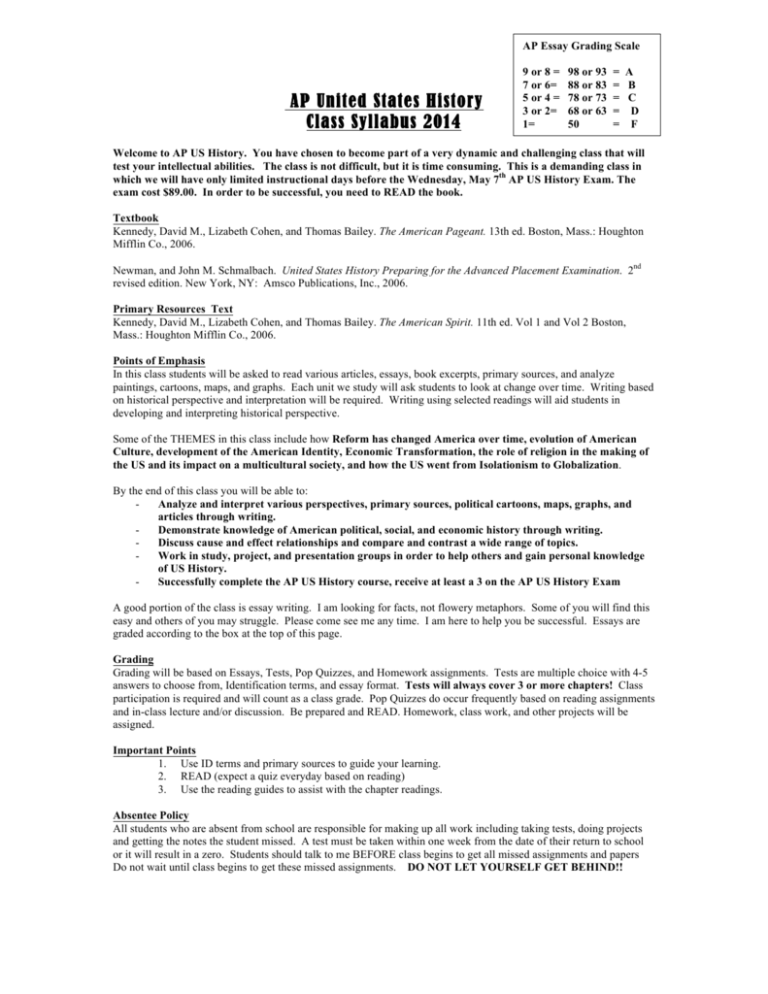
AP Essay Grading Scale AP United States History Class Syllabus 2014 9 or 8 = 7 or 6= 5 or 4 = 3 or 2= 1= 98 or 93 88 or 83 78 or 73 68 or 63 50 = A = B = C = D = F Welcome to AP US History. You have chosen to become part of a very dynamic and challenging class that will test your intellectual abilities. The class is not difficult, but it is time consuming. This is a demanding class in which we will have only limited instructional days before the Wednesday, May 7th AP US History Exam. The exam cost $89.00. In order to be successful, you need to READ the book. Textbook Kennedy, David M., Lizabeth Cohen, and Thomas Bailey. The American Pageant. 13th ed. Boston, Mass.: Houghton Mifflin Co., 2006. Newman, and John M. Schmalbach. United States History Preparing for the Advanced Placement Examination. 2nd revised edition. New York, NY: Amsco Publications, Inc., 2006. Primary Resources Text Kennedy, David M., Lizabeth Cohen, and Thomas Bailey. The American Spirit. 11th ed. Vol 1 and Vol 2 Boston, Mass.: Houghton Mifflin Co., 2006. Points of Emphasis In this class students will be asked to read various articles, essays, book excerpts, primary sources, and analyze paintings, cartoons, maps, and graphs. Each unit we study will ask students to look at change over time. Writing based on historical perspective and interpretation will be required. Writing using selected readings will aid students in developing and interpreting historical perspective. Some of the THEMES in this class include how Reform has changed America over time, evolution of American Culture, development of the American Identity, Economic Transformation, the role of religion in the making of the US and its impact on a multicultural society, and how the US went from Isolationism to Globalization. By the end of this class you will be able to: Analyze and interpret various perspectives, primary sources, political cartoons, maps, graphs, and articles through writing. Demonstrate knowledge of American political, social, and economic history through writing. Discuss cause and effect relationships and compare and contrast a wide range of topics. Work in study, project, and presentation groups in order to help others and gain personal knowledge of US History. Successfully complete the AP US History course, receive at least a 3 on the AP US History Exam A good portion of the class is essay writing. I am looking for facts, not flowery metaphors. Some of you will find this easy and others of you may struggle. Please come see me any time. I am here to help you be successful. Essays are graded according to the box at the top of this page. Grading Grading will be based on Essays, Tests, Pop Quizzes, and Homework assignments. Tests are multiple choice with 4-5 answers to choose from, Identification terms, and essay format. Tests will always cover 3 or more chapters! Class participation is required and will count as a class grade. Pop Quizzes do occur frequently based on reading assignments and in-class lecture and/or discussion. Be prepared and READ. Homework, class work, and other projects will be assigned. Important Points 1. Use ID terms and primary sources to guide your learning. 2. READ (expect a quiz everyday based on reading) 3. Use the reading guides to assist with the chapter readings. Absentee Policy All students who are absent from school are responsible for making up all work including taking tests, doing projects and getting the notes the student missed. A test must be taken within one week from the date of their return to school or it will result in a zero. Students should talk to me BEFORE class begins to get all missed assignments and papers Do not wait until class begins to get these missed assignments. DO NOT LET YOURSELF GET BEHIND!! NOTEBOOK/SUPPLIES! All students will keep a three-ring binder/virtual notebook divided into sections. Those sections may include: Primary Source Assignments Notes and ALL class work/notes and handouts in the order they are given out Record of all test scores and project grades Completed and Graded Assignments Plan ahead: You will need a flash drive, ear buds, and a computer microphone(optional). Once we get out laptops on September 3rd, we will shift away from the three-ring binder. There will be different APPS that will NEED to download. Homework Homework will appear on the board. The student should make every effort to write down any assignment. Also, be prepared to complete reading assignments on a daily basis. You can expect a POP QUIZ two times a week based on reading assignments and class material. Primary sources and questions may be accessed using Evernote or Edmodo. Answers should be kept in your notebook. Topic Presentation In this class you will be assigned a topic/time period to present. This will introduce the next Unit. Everyone’s topic and presentation is different and I will allow you to choose your topic on the first day of school. 1. The presentation can be in any format you choose such as PowerPoint, Keynote, Inspire, etc. but I encourage you to use some form of technology. 2. In the presentation, you must introduce the class to your topic. Your topic must include no more than two main ideas/events in each of the following areas: Social, Political, Economic, Diplomatic, and Cultural. 3. You must also include at least 3 primary sources to help you in supporting your topic presentation. This can include letters, newspaper articles, maps, advertisements, artwork, quotes from period books or novels, speeches, graphs, etc. Each of the 3 documents or primary sources should address a different aspect (social, political, etc). The documents should be the framework around your description of your assigned topic/time period. Simple pictures of people, and things may not count as a document. You should ask for help if you are questioning whether it will work or not. 4. After you explain the main idea/event to the class, you must also explain the result/reaction by the government or society to this event. 5. Don’t hesitate to ask for help! Presentations should last no longer than 10 minutes. DO NOT JUST READ THE PRESENTATION to the class. You must be an expert on the topic you are assigned. Key Vocabulary All students will be given Key Vocabulary terms. These will be given before each lesson. These terms are given so that the student may use them to prepare for a test, and check for understanding of the main ideas during or after reading. Tardy Policy Tardiness will not be tolerated. Students must be in their assigned seats working on the question of the day, vocabulary, or other assigned activities. I will strictly follow the schools policy regarding a student who is tardy. **You may contact me by using the following e-mail address: chandlerrc@rss.k12.nc.us ** Follow JCHS_AH on Twitter!! ** Sign up for Remind 101: TEXT- @f2baf9 TO- (469)-518-6902 Helpful Hints to success: Read every night—follow the calendar Analyze information- don’t just memorize it Read- don’t put it off! Ask questions- come see me - Don’t get frustrated or overwhelmedtake your time Ask for help- I am here for you Get a study group organized- share Be prepared every day for class- you don’t know what may happen - READ AP US History (American Pageant) First Period Course Calendar Fall 2014 Textbook Pages Topics Approximate Test Date Pg. 4-104 Colonial America September 4 Pg. 104-190 Revolution-Constitution September 10 9/11 Pg. 190-256 Early Republic-Monroe September 17 9/18 Pg. 256-390 Jackson/Reform/Manifest Destiny September 24 Pg. 390-504 Causes/Civil War/Reconstruction October 2 10/3 Pg. 504-626 Farmer/Industry/Immigration/Gilded Age October 14 10/15 Pg. 626-696 Imperialism and Progressive Era October 23 Midterm Exam END OF 1st QUARTER October 24 October 24 Pg. 696-800 WWI/ 20’s/ Depression/ New Deal October 31 November 7 Pg. 800-909 WWII/ Cold War 1950’s November 19 Presentation Dates 9/25 10/25 11/3 11/10 400 QUESTIONS 11/20 Pg. 882-966 Civil Rights November 25 12/1 Pg 909-942 New Frontier/Great Society/ Vietnam December 10 Pg. 942-1024 Nixon/ 1970’s/ 1980’s/ 1990’s December 22 AP REVIEW January 5-9 Final Exams January 12-15 AP US HISTORY EXAM Friday, May 8th 8:00 am 12/11 AP US History Course Calendar Fall 2014 Colonial America August 25 - September 4 American Pageant: Chapter 1, New World Beginnings New world geology, Pre-Columbian America, Africans and Europeans, Columbian exchange, Mexican conquest, rise of Spain, Conquistadores Spirit: Visualizing the New World 1506-1510 Hernan Cortez Conqers Mexico Aztec Chroniclers Describe the Spenish Conuest of Mexico Mungo Park Describes Slavers in the African Interior 1790 John Cabot Voyages for England 1497 American Pageant: Chapter 2, The Planting of English America Jamestown, English and the Natives, Virginia an Maryland, England in the Caribbean, Carolinas and Georgia. Spirit: Starving Time 1609 The Intolerant Act of Toleration 1649 Persecutions of the Catholics 1656 American Pageant: Chapter 3, Settling the Northern Colonies Puritan New England religion, Massachusetts Bay Colony establishment, resistance and control in New England colonies. Spirit: Framing the Mayflower Compact 1620 John Cotton Describes New England’s “Theocracy” 1636 Anne Hutchinson is Banished 1637 John Winthrop’s Concept of Liberty 1645 American Pageant: Chapter 4, American Life in the 17th Century Tobacco and Slave Labor, Rebellion in Virginia, African American culture, Society and Life in New England and the Southern Colonies, Salem witch trials. Spirit: A Contract for Indentured Service 1635 The Baconite Grievances 1677 Slavery is Justified The Conscience of a Slave Trader 1694 The Stono River Rebellion in South Carolina 1739 Cotton Mather on the Education of his Children 1706 The Salem Witchcraft Hysteria 1692 American Pageant: Chapter 5, Colonial Society on the Eve of the Revolution Immigration and population growth, Atlantic economy, religion, Great Awakening, Education in Colonial America, Zenger Case and freedom of the press. Spirit: Gottlieb Mittleberger Voyages to Pennsylvania 1750 The Pattern of Colonial Commere 1766 Unit Test: Thursday September 4 Chapters 1-5 Multiple choice, key terms, and essay questions. DBQ on Southwest American Settlement Revolution-Constitution September 5 – September 10 American Pageant: Chapter 6, The Duel for North America Fur trade and the French competition, consequences of the French and Indian War, Pontiacs Rebellion and the Proclamation of 1763 Spirit: Pontiac Rallies his Warriors 1763 The Proclamation of 1763 American Pageant: Chapter 7, The Road to Revolution Roots of revolution, mercantilism, salutary neglect vs. taxation, resistance to taxes, organization of the colonies, failure of diplomacy, first conflicts Spirit: Benjamin Franklin Testifies Against the Stamp Act 1766 Philadelphia Threatens Tea Men 1773 American Pageant: Chapter 8, American Secedes from the Empire The American Revolution, Patriots and Loyalists, French alliance, Declaration of Independence, life on the home front, women and the war, peace. Spirit: Thomas Paine Talks Common Sense 1776 Thomas Jefferson’s Declaration of Independence The Hanging of a Loyalist John Adams Contemplates a Model Treaty 1776 American Pageant: Chapter 9, The Confederation and the Constitution The Articles of Confederation and the Constitution, state vs. central power, the Enlightenment, slavery and religion in the political process, creation of sectionalism at the Constitutional Convention, rebellion Spirit: The Argument over Slave Importations 1787 George Mason is Critical 1787 An Anti-Federalist Demands Deliberation 1787 James Madison Defends the New Constitution 1787 Documents: Common Sense and Crisis by Thomas Paine The Declaration of Independence The Constitution of the United States Federalist Papers Unit Test: Wednesday September 10 Chapter 6-9 Multiple choice, key terms, and essay questions. DBQ on the French and Indian War Early Republic-Monroe September 11 – September 17 American Pageant: Chapter 10, Launching the New Ship of State Politics in early federal America, the economics behind a National Bank, Conflicts and foreign affairs with Britain, Precedents established, Federal vs. Republican vision of governments. Spirit: State Debts and the National Bank Overawing the Whiskey Boys The Retirement of Washington American Pageant: Chapter 11, Triumphs and Travails of Jeffersonian Democracy The “Revolution of 1800,” John Marshall and federal power strengthened, diplomacy of Jefferson and Madison, the Embargo Act, conflicts with Natives and westward settlement. Spirit: The Three-Fifths Clause Gives Jefferson a Dubious Victory Marshall Sanctions the Bank 1819 Lewis and Clark Meet a Grizzly 1805 The Resort to Economic Coercion American Pageant: Chapter 12, The Second War for Independence/Nationalism The War of 1812, The Era of Good Feelings, The American System, Monroe Doctrine and the establishment of US position in foreign affairs, Expansion westward and the growth of slavery/sectionalism Spirit: Tecumseh Challenges William Henry Harrison 1810 Disloyalty in New England Missouri Statehood Controversy Unit Test: Wednesday, September 17 Chapters 10-12 Multiple choice, key terms, and essay questions. DBQ: Evaluate the accuracy of the time period after the War of 1812 as an ‘Era of Good Feelings” Jackson/Reform/Manifest Destiny September 18 - September 24 American Pageant: Chapter 13, The Rise of a Mass Democracy Jacksonian democracy, Whigs, BUS, Indian Removal Act, “common man” politics, states rights and nullification Spirit: Jackson Vetoes the Maysville Road Bill 1830 Clay Protests 1830 Nullification Crisis Transplanting the Tribes The Emergence of Mass Political Parties American Pageant: Chapter 14, Forging the National Economy The market economy, immigration and nativism, the Lowell system and women, the transportation revolution, commercial agriculture. Spirit: The Spread of the Factory Agitation for the Ten-Hour Day 1835 The Coming of the Iron Horse American Pageant: Chapter 15, The Ferment of Reform and Culture Religion and reform, women’s roles in reform movements, a national artistic and literary movement, advances in education, science, invention, technology, utopian community experiment. Spirit: The Changing Role of Women Three Views of Indians American Pageant: Chapter 16, The South and the Slavery Controversy Cotton culture, southern society and the impact of the plantation system, the abolition movement Spirit: A Slave Boy Learns a Lesson 1827 A Former Slave Exposes Slavery 1850 Documents: Seneca Falls Declaration of Sentiments and Resolutions The Night Thoreau Spent in Jail Sociology for the South vs. Uncle Tom’s Cabin American Pageant: Chapter 17, Manifest Destiny and its Legacy Polk’s impact on the shape of American landscape, Manifest Destiny, war with Mexico Spirit: Provoking War with Mexico Unit Test: Wednesday, September 24 Chapters 14-17 Multiple choice, key terms, and essay questions. DBQ Causes/Civil War/ Reconstruction September 25 – October 2nd American Pageant: Chapter 18, Renewing the Sectional Struggle Popular sovereignty, the Compromise of 1850, Fugitive Slave Law, Kansas Nebraska Act. Spirit: David Wilmot Appeals for Free Soil 1847 Southerners Threaten Secession 1849 Reactions to the Fugitive Slave Law The Debate over the Kansas-Nebraska Bill American Pageant: Chapter 19, Drifting Toward Disunion The impact of Uncle Toms Cabin, Dred Scott case and its impact, Lincoln-Douglas debates, John Brown, division of American in 1860 and the resulting secession. Spirit: The Dred Scott Decision The Lincoln-Douglas Debates American Pageant: Chapter 20, Girding for War Martial Law and the boarder states, women and the war, advantages and disadvantages by region, the economy of the war, European impact on the war. Spirit: British Involvement Abraham Lincoln Defines the Purposes of the War American Pageant: Chapter 21, The Furnace of the Civil War The Peninsula Campaign, battle plans, the war in the West, Sherman’s March, Appomattox, politics behind the Emancipation Proclamation, the legacy of war in both the North and South, assassination. Spirit: The Proclaiming of Emancipation Documents: The Gettysburg Address American Pageant: Chapter 22, The Ordeal of Reconstruction Reconstruction policy: Congress vs. Presidential, economics and freedom after the war, resistance to Reconstruction, the end of Reconstruction, the New South, impeachment politics and the balance of power Spirit: The Debate on Reconstruction Policy The Legacy of Reconstruction “Black Reconstruction” Unit Test: Thursday, October 2nd Chapters 18-22 Multiple choice, key terms, and essay questions. DBQ: Effectiveness of Reconstruction Farmer/Industry/Immigration/Gilded Age October 3rd – October 14th American Pageant: Chapter 23, Political Paralysis in the Gilded Age Big business, corruption, the rise of Jim Crow, Railroads and the Farmer, Populism and its legacy Spirit: The Spread of Segregation Cleveland and the Tariff American Pageant: Chapter 24, Industry Comes of Age Railroads connect America, Robber Barons, growth of unions, New South, government and politics of regulation in industry and railroads. Spirit: A Defense of Long Haul Rates 1885 John D. Rockefeller Justifies Rebates 1899 Andrew Carnegies Gospel of Wealth 1889 Labor in Industrial America American Pageant: Chapter 25, America Moves to the City Urbanization, Industrialization, new waves of immigration and restrictions, nativism, AfricanAmericans and the early Civil Rights, “New Woman”, turn of the century culture Spirit: The New Immigration The Church on the Defensive Anti-Saloon Crusade Changing Role of Women American Pageant: Chapter 26, The Great West and the Agricultural Revolution Culture of the West, impact of the railroad on Native Americans and the growth of America, the close of the frontier and its impact, industrialization of agriculture and political dissent among farmers, Populism, the debate behind bimetallism. Spirit: The Plight of the Indian The Farmers Protest Movement The Pullman Strike The Free Silver Mirage Documents: Jacob Riis, How the Other Half Lives Frederick J. Turner, Frontier in American History William Jennings Bryan, “Cross of Gold” speech Populist Party Platform 1892 Unit Test: Tuesday, October 14th Chapters 23-26 Multiple choice, key terms, and essay questions. DBQ Free Response Imperialism and Progressive Era October 15th – October 23rd American Pageant: Chapter 27, Empire and Expansion American expansion overseas, Imperialism, The Spanish-American War, the Open Door Policy, Economics and newspapers of imperialism, addition to the Monroe Doctrine. Spirit: Yellow Journalism in Flower The Debate over Imperialism Roosevelt Launches a Corollary 1904 American Pageant: Chapter 28, Progressivism and the Republican Roosevelt Progressive reform, trust busting, labor, prohibition and women, demographics of urbanization and the resulting political impact, “Dollar Diplomacy,” environmental issues Spirit: The Heyday of Muckraking The Crusade for Woman Suffrage American Pageant: Chapter 29, Wilsonian Progressivism at Home and Abroad The Election of 1912, New Freedom versus the New Nationalism, Progressive economic reform, diplomacy of neutrality and isolationism, Spirit: The Election of 1912 Campaigning for Monetary Reform Acquiescing in the British Blockade Documents: Alfred T. Mahan, The Influence of Sea Power Upon History Unit Test: Thursday, October 23rd Chapters 27-29 Multiple choice, key terms, and essay questions. WWI/ 1920’s /Depression and New Deal October 28th – November 7th American Pageant: Chapter 30, The War to End War War in Europe and war on the home front, propaganda and civil liberties, Fourteen Points, the Great Migration, the politics behind the making of the Treaty of Versailles and its rejection by the U.S. Senate. Spirit: The Propaganda Front Struggle over the Peace Treaty Documents: Woodrow Wilson’s War Message to Congress American Pageant: Chapter 31, American Life in the Roaring Twenties The “Red Scare” and immigration issues, Prohibition, a mass-consumption economy, the Jazz Age and the Harlem Renaissance, traditionalism versus modernism, culture and religious debate, the emergence of the American hero. Spirit: The Reconstituted Ku Klux Klan New Goals for Women American Pageant: Chapter 32, The Politics of Boom and Bust Isolationism and Laissez-faire in the 1920s, radio and mass culture, foreign debt, high tariffs, and diplomacy, Black Tuesday and the causes of the Great Depression Spirit: Warren Harding and the Washington Conference Herbert Hoover Clashes with Franklin Roosevelt An Appraisal of Hoover American Pageant: Chapter 33, The Great Depression and the New Deal FDR and “recovery, relief, reform,” the debate over socialistic programs and their critics, Depression impact on society, cultural changes in the 1930s, New Deal Programs and their legacy, the attempted expansion of the Supreme Court, political power struggle. Spirit: The Face of the Great Depression Voices of Protest Conservation in the New Deal The Supreme Court Fight and After FDR Inaugural Address (sound recording) Unit Test: Friday, October 31st and Friday, November 7th Chapters 30-33 Multiple choice, key terms, and essay questions. DBQ: Effectiveness of the New Deal WWII/Cold War/ 1950’s November 10th – November 19th American Pageant: Chapter 34, FDR and the Shadow of War Attempts at neutrality and isolation, the end of isolationism, diplomacy and economics of the prewar years, preparation of war, declaration war following Pearl Harbor Spirit: The Struggle Against Isolationism American Pageant: Chapter 35, America in World War II The war in Europe and in the Pacific, the home front economy, changes for women and minorities during the war, the decision to use the atomic bomb and its consequences, civil rights violations during war time on the Japanese Americans Spirit: War and American Society Dropping of the Atomic Bomb American Pageant: Chapter 36, The Cold War Begins Postwar prosperity and the Baby Boom, communism and containment, diplomacy and the Marshall Plan, the Red Scare, abandonment of peace time isolationism, Korean War American Pageant: Chapter 37, The Eisenhower Era Suburbia, car and consumer culture in the 1950s, migration, McCarthyism, Cold War expansion, the space race, postwar literature and culture FDR Declaration of War (sound recording) Unit Test: Wednesday, November 19th Chapters 34-37 Multiple choice, key terms, and essay questions. DBQ Free Response Civil Rights Movement November 20th – November 25th American Pageant: Chapter 37, The Eisenhower Era The civil rights revolution begins, leaders and organization, the social impact of ending segregation, Brown v. Board American Pageant: Chapter 38, The Stormy Sixties The civil rights revolution explodes, the politics behind Civil Rights, Civil Rights and Vietnam American Pageant: Chapter 39 The Stalemated Seventies Civil Rights, desegregation, and Affirmative Action Unit Test: Tuesday, November 25th Chapters 37-39 Multiple choice, key terms, and essay questions. New Frontier/Great Society/ Vietnam December 1st – December 10th American Pageant: Chapter 38, The Stormy Sixties The Cold War continues, expansion of the war in Vietnam, the civil rights revolution and evolution, Johnson and the Great Society, immigration and demographic changes. American Pageant: Chapter 39, The Stalemated Seventies Legacy of Vietnam, rise of conservatism, economic stagnation, crisis over presidential power, environmental issues, feminism and the women’s movement, civil rights and affirmative action, foreign policy. Unit Test: Wednesday, December 10th Chapters 38-39 Multiple choice, key terms, and essay questions. Nixon/1970’s/1980’s/1990’s/Present December 11th –December 22nd American Pageant: Chapter 39, The Stalemated Seventies Rise of conservatism, economic stagnation, crisis over presidential power, environmental issues, feminism and the women’s movement, civil rights and affirmative action, foreign policy and the issue of oil American Pageant: Chapter 40, The Resurgence of Conservatism Reagan and the “New Right,” the end of the Cold War, Reaganomics, politics and the Supreme Court, globalization, war and diplomacy in the Middle East American Pageant: Chapter 41, American Confronts the Post-Cold War Era The Clinton era, post-Cold War politics and foreign policy, the controversial election of 2000, the attack on the World Trade Center and America post-9/11 American Pageant: Chapter 42, The American People Face a New Century Demographic changes, changes in the family, immigration and related issues, a multicultural society, the high-tech economy, America in a global context Documentary History: Chapters 30 and 31 Republican Contract with America George W. Bush, Washington National Cathedral Prayer Service, September 2001 George W. Bush, Joint Session of Congress, September 2001 Rudy Giuliani, Farewell Address, 2001 Unit Test: Monday, December 22nd Chapters 39-42 Multiple choice, key terms, and essay questions. January 5th – January 9th – Final Exam Review January 12th – January 16th – Final Exams Second Semester REVIEW: Details to be announced. I am planning review meetings this spring where we will discuss and review US History. The greatest challenge to most Fall semester students is retaining the vast amount of information we have covered. You must also review on your own, if you are going to be successful on the AP exam! AP US HISTORY EXAM: Friday, May 7th 8:00am
